Editor’s Note: This is the fourth chapter of Alfred the Great, by Jacob Abbot (published 1872).
IV. Alfred’s Early Years
Before commencing the narrative of Alfred’s administration of the public affairs of his realm, it is necessary to go back a little, in order to give some account of the more private occurrences of his early life. Alfred, like Washington, was distinguished for a very extraordinary combination of qualities which exhibited itself in his character, viz., the combination of great military energy and skill on the one hand, with a very high degree, on the other, of moral and religious principle; and conscientious devotion to the obligations of duty. This combination, so rarely found in the distinguished personages which have figured among mankind, is, in a great measure, explained and accounted for, in Alfred’s case, by the peculiar circumstances of his early history.
It was his brother Ethelred, as has already been stated, whom Alfred immediately succeeded. His father’s name was Ethelwulf; and it seems highly probable that the peculiar turn which Alfred’s mind seemed to take in after years, was the consequence, in some considerable degree, of this parent’s situation and character. Ethelwulf was a younger son, and was brought up in a monastery at Winchester. The monasteries of those days were the seats both of learning and piety, that is, of such learning and piety as then prevailed. The ideas of religious faith and duty which were entertained a thousand years ago were certainly very different from those which are received now; still, there was then, mingled with much superstition, a great deal of honest and conscientious devotion to the principles of Christian duty, and of sincere and earnest desire to live for the honor of God and religion, and for the highest and best welfare of mankind. Monastic establishments existed every where, defended by the sacredness which invested them from the storms of violence and war which swept over every thing which the cross did not protect. To these, the thoughtful, the serious, and the intellectual retired, leaving the restless, the rude, and the turbulent to distract and terrify the earth with their endless quarrels. Here they studied, they wrote, they read; they transcribed books, they kept records, they arranged exercises of devotion, they educated youth, and, in a word, performed, in the inclosed and secluded retreats in which they sought shelter, those intellectual functions of civil life which now can all be performed in open exposure, but which in those days, if there had been no monastic retreats to shelter them, could not have been performed at all. For the learning and piety of the present age, whether Catholic or Protestant, to malign the monasteries of Anglo-Saxon times is for the oak to traduce the acorn from which it sprung.
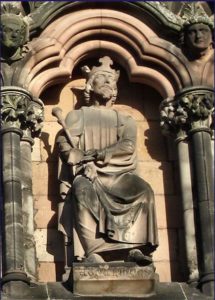
Ethelwulf was a younger son, and, consequently, did not expect to reign. He went to the monastery at Winchester, and took the vows. His father had no objection to this plan, satisfied with having his oldest son expect and prepare for the throne. As, however, he advanced toward manhood, the thought of the probability that he might be called to the throne in the event of his brother’s death led all parties to desire that he might be released from his monastic vows. They applied, accordingly, to the pope for a dispensation. The dispensation was granted, and Ethelwolf became a general in the army. In the end, his brother died, and he became king.
He continued, however, during his reign, to manifest the peaceful, quiet, and serious character which had led him to enter the monastery, and which had probably been strengthened and confirmed by the influences and habits to which he had been accustomed there. He had, however, a very able, energetic, and war-like minister, who managed his affairs with great ability and success for a long course of years. Ethelwulf, in the mean time, leaving public affairs to his minister, continued to devote himself to the pursuits to which his predilections inclined him. He visited monasteries; he cultivated learning; he endowed the Church; he made journeys to Rome. All this time, his kingdom, which had before almost swallowed up the other kingdoms of the Heptarchy, became more and more firmly established, until, at length, the Danes came in, as is described in the last chapter, and brought the whole land into the most extreme and imminent danger. The case did not, however, become absolutely desperate until after Ethelwulf’s death, as will be hereafter explained.
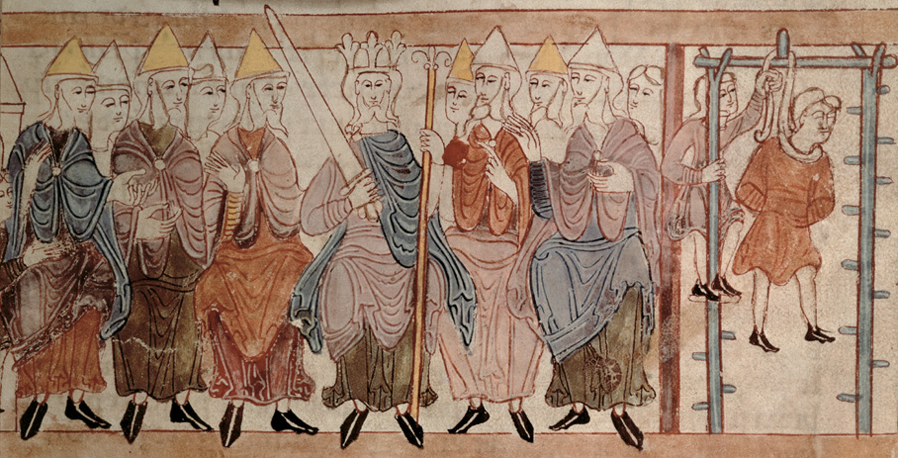
Ethelwulf married a lady whose gentle, quiet, and serious character corresponded with his own. Alfred was the youngest, and, as is often the case with the youngest, the favorite child. He was kept near to his father and mother, and closely under their influence, until his mother died, which event, however, took place when he was quite young. After this, Ethelwulf sent Alfred to Rome. Rome was still more the great center then than it is now of religion and learning. There were schools there, maintained by the various nations of Europe respectively, for the education of the sons of the nobility. Alfred, however, did not go for this purpose. It was only to make the journey, to see the city, to be introduced to the pope, and to be presented, by means of the fame of the expedition, to the notice of Europe, as the future sovereign of England; for it was Ethelwulf’s intention, at this time, to pass over his older sons, and make this Benjamin his successor on the throne.
The journey was made with great pomp and parade. A large train of nobles and ecclesiastics accompanied the young prince, and a splendid reception was given to him in the various towns in France which he passed through on his way. He was but five years old; but his position and his prospects made him, though so young, a personage of great distinction, After spending a short time at Rome, he. returned again to England.
Two years after this, Ethelwulf, Alfred’s father, determined to go to Rome himself. His wife had died, his older sons had grown up, and his own natural aversion to the cares and toils of government seems to have been increased by the alarms and dangers produced by the incursions of the Danes, and by his own advancing years. Having accordingly arranged the affairs of the kingdom by placing his oldest sons in command; he took the youngest, Alfred, who was now seven years old, with him, and, crossing the Channel, landed on the Continent. on his way to Rome.
All the arrangements for this journey were conducted on a scale of great magnificence and splendor. It is true that it was a rude and semi-barbarous age, and very little progress had been made in respect to the peaceful and industrial arts of life; but, in respect to the arts connected with war, to every thing that related to the march of armies, the pomp and parade of royal progresses, the caparison of horses, the armor and military dresses of men, and the parade and pageantry of military spectacles, a very considerable degree of advancement had been attained.
King Ethelwulf availed himself of all the resources that he could command to give eclat to his journey. He had a numerous train of attendants and followers, and he carried with him a number of rich and valuable presents for the pope. He was received with great distinction by King Charles of France, through whose dominions he had to pass on his way to Italy. Charles had a daughter, Judith, a young girl, with whom Ethelwulf, though now himself quite advanced in life, fell deeply in love.
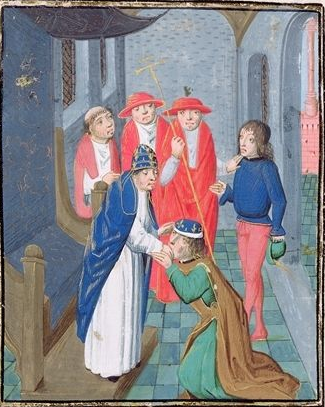
Ethelwulf, after a short stay in France, went on to Rome. His arrival and his visit here attracted great attention. As King of England, he was a personage of very considerable consequence, and then he came with a large retinue, and in magnificent state. His religious, predilections, too, inspired, him with a very strong interest in the ecclesiastical authorities, and institutions of Rome, and awakened, reciprocally, in these authorities, a strong interest in him. He made costly presents to the pope, some of which were peculiarly splendid. One was a crown of pure gold, which weighed, it is said, four pounds. Another was a sword, richly mounted in gold. There were also several utensils and vessels of Saxon form and construction, some of gold and others of silver gilt, and also a considerable number of dresses, all very richly adorned. King Ethelwulf also made a distribution in money to all the inhabitants of Rome; gold to the nobles and to the clergy, and silver to the people. How far his munificence on this occasion may have been exaggerated by the Saxon chroniclers, who, of course, like other early historians, were fond of magnifying all the exploits, and swelling, in every way, the fame of the heroes of their stories, we can not now know. There is no doubt, however, that all the circumstances of Ethelwulf’s visit to the great capital were such as to attract universal attention to the event, and to make the little Alfred, on whose account the journey was in a great measure performed, an object of very general interest and attention.
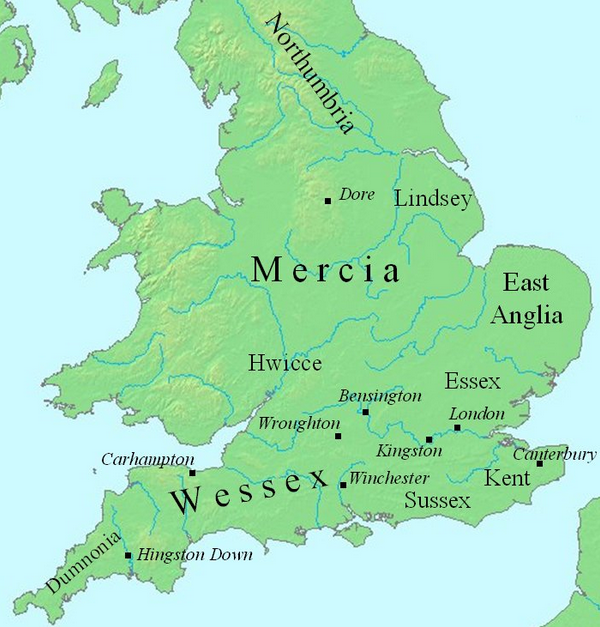
In fact, there is every reason to believe that the Saxon nations had, at that time, made such progress in wealth, population, and power as to afford to such a prince as Ethelwulf the means of making a great display, if he chose to do so, on such an occasion as that of a royal progress through France and a visit to the great city of Rome. The Saxons had been in possession of England, at this time, many hundred years; and though, during all this period they had been involved in various wars, both with one another and with the neighboring nations, they had been all the time steadily increasing in wealth, and making constant improvements in all the arts and refinements of life. Ethelwulf reigned, therefore, over a people of considerable wealth and power, and he moved across the Continent on his way to Rome, and figured while there, as a personage of no ordinary distinction.
Rome was at this time, as we have said, the great center of education, as well as of religious and ecclesiastical influence. In fact, education and religion went hand in hand in those days, there being scarcely any instruction in books excepting for the purposes of the Church. Separate schools had been established at Rome by the leading nations of Europe, where their youth could be taught, each at an institution in which his own language was spoken. Ethelwolf remained a year at Rome, to give Alfred the benefit of the advantages which the city afforded. The boy was of a reflective and thoughtful turn of mind, and applied himself diligently to the performance of his duties. His mind was rapidly expanded, his powers were developed, and stores of such knowledge as was adapted to the circumstances and wants of the times were laid up. The religious and intellectual influences thus brought to bear upon the young Alfred’s mind produced strong and decided effects in the formation of his character—effects which were very strikingly visible in his subsequent career.
Ethelwulf found, when he arrived at Rome, that the Saxon seminary had been burned the preceding year. It had been founded by a former Saxon king. Ethelwulf rebuilt it, and placed the institution on a new and firmer foundation than before. He also obtained some edicts from the papal government to secure and confirm certain rights of his Saxon subjects residing in the city, which rights had, it seems, been in some degree infringed upon, and he thus saved his subjects from oppressions to which they had been exposed. In a word, Ethelwulf’s visit not only afforded an imposing spectacle to those who witnessed the pageantry and the ceremonies which marked it, but it was attended with permanent and substantial benefits to many classes, who became, in consequence of it, the objects of the pious monarch’s benevolent regard.
At length, when the year had expired, Ethelwulf set out on his return. He went back through France, as he came, and during his stay in that country on the way home, an event occurred which was of no inconsiderable consequence to Alfred himself, and which changed or modified Ethelwulf’s whole destiny. The event was that, having, as before stated, become enamored with the young Princess Judith, the daughter of the King of France, Ethelwulf demanded her in marriage. We have no means of knowing how the proposal affected the princess herself; marriages in that rank and station in life were then, as they are now, in fast, wholly determined and controlled by great political considerations, or by the personal predilections of powerful men, with very little regard for the opinions or desires of the party whose happiness was most to be affected by the result. At all events, whatever, may have been Judith’s opinion, the marriage was decided upon and consummated, and the venerable king returned to England with his youthful bride. The historians of the day say, what would seem almost incredible, that she was but about twelve years old.
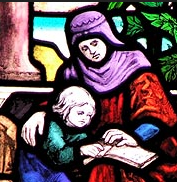
Judith’s Saxon name was Leotheta. She made an excellent mother to the young Alfred, though she innocently and indirectly caused her husband much trouble in his realm. Alfred’s older brothers were wild and turbulent men, and one of them, Ethelbald, was disposed to retain a portion of the power with which he had been invested during his father’s absence, instead of giving it up peaceably on his return. He organized a rebellion against his father, making the king’s course of conduct in respect to his youthful bride the pretext. Ethelwulf was very fond of his young wife, and seemed disposed to elevate her to a position of great political consideration and honor. Ethelbald complained of this. The father, loving peace rather than war, compromised the question with him, and relinquished to him a part of his kingdom. Two years after this he died, leaving Ethelbald the entire possession of the throne. Ethelbald, as if to complete and consummate his unnatural conduct toward his father, persuaded the beautiful Judith, his father’s widow, to become his wife, in violation not only of all laws human and divine, but also of those universal instincts of propriety which no lapse of time and no changes of condition can eradicate from the human soul. This second union throws some light on the question of Judith’s action. Since she was willing to marry her husband’s son to preserve the position of a queen, we may well suppose that she did not object to uniting herself to the father in order to attain it. Perhaps, however, we ought to consider that no responsibility whatever, in transactions of this character, should attach to such a mere child.
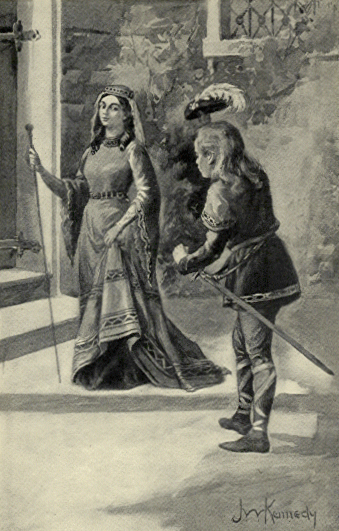
During all this time Alfred was passing from his eighth to his twelfth, year. He was a very intelligent and observing boy, and had acquired much knowledge of the world and a great deal of general information in the journeys which he had taken with his father, both about England and also on the Continent, in France and Italy. Judith had taken a great interest in his progress. She talked with him, she encouraged his inquiries, she explained to him what he did not understand, and endeavored in every way to develop and strengthen his mental powers. Alfred was a favorite, and, as such, was always very much indulged; but there was a certain conscientiousness and gentleness of spirit which marked his character even in these early years, and seemed to defend him from the injurious influences which indulgence and extreme attention and care often produce. Alfred was considerate, quiet, and reflective; he improved the privileges which he enjoyed, and did not abuse the kindness and the favors which every one by whom he was known lavished upon him.
Alfred was very fond of the Anglo-Saxon poetry which abounded in those days. The poems were legends, ballads, and tales, which described the exploits of heroes, and the adventures of pilgrims and wanderers of all kinds. These poems were to Alfred what Homer’s poems were to Alexander. He loved to listen to them, to hear them recited, and to commit them to memory. In committing them to memory, he was obliged to depend upon hearing the poems repeated by others, for he himself could not read.
And yet he was now twelve yeas old. It may surprise the reader, perhaps, to be thus told, after all that has been said of the attention paid to Alfred’s education, and of the progress which he had made, that he could not even read. But reading, far from being then considered, as it is now, an essential attainment for all, and one which we are sure of finding possessed by all who have received any instruction whatever, was regarded in those days a sort of technical art, learned only by those who were to make some professional use of the acquisition. Monks and clerks could always read, but generals, gentlemen, and kings very seldom. And as they could not read, neither could they write. They made a rude cross at the end of the writings which they wished to authenticate instead of signing their names—a mode which remains to the present day, though it has descended to the very lowest and humblest classes of society.
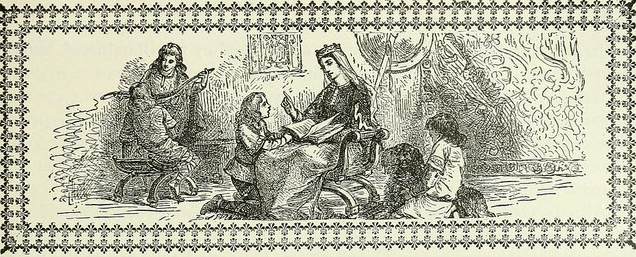
In fact, even the upper classes of society could not generally learn to read in those days, for there were no books. Every thing recorded was in manuscripts, the characters being written with great labor and care, usually on parchment, the captions and leading letters being often splendidly illuminated and adorned by gilded miniatures of heads, or figures, or landscapes, which enveloped or surrounded them. Judith had such a manuscript of some Saxon poems. She had learned the language while in France. One day Alfred was looking at the book, and admiring the character in which it was written, particularly the ornamented letters at the headings. Some of his brothers were in the room, they, of course, being much older than he. Judith said that either of them might have the book who would first learn to read it. The older brothers paid little attention to this proposal, but Alfred’s interest was strongly awakened. He immediately sought and found some one to teach him, and before long he read the volume to Judith, and claimed it as his own. She rejoiced at his success, and fulfilled her promise with the greatest pleasure.
Alfred soon acquired, by his Anglo-Saxon studies, a great taste for books, and had next a strong desire to study the Latin language. The scholars of the various nations of Europe formed at that time, as, in fact, they do now, one community, linked together by many ties. They wrote and spoke the Latin language, that being the only language which could be understood by them all. In fact, the works which were most highly valued then by the educated men of all nations, were the poems and the histories, and other writings produced by the classic authors of the Roman commonwealth. There were also many works on theology, on ecclesiastical polity, and on law, of great authority and in high repute, all written in the Latin tongue. Copies of these works were made by the monks, in their retreats in abbeys and monasteries, and learned men spent their lives in perusing them. To explore this field was not properly a duty incumbent upon a young prince destined to take a seat upon a throne, but Alfred felt a great desire to undertake the work. He did not do it, however, for the reason, as he afterward stated, that there was no one at court at the time who was qualified to teach him.
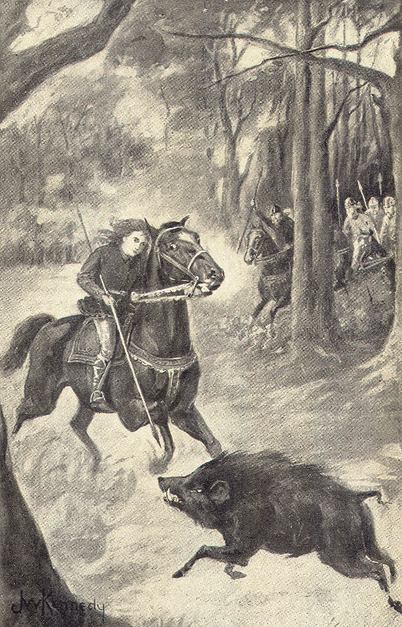
Alfred, though he had thus the thoughtful and reflective habits of a student, was also active, and graceful, and strong in his bodily development. He excelled in all the athletic recreations of the time, and was especially famous for his skill, and courage, and power as a hunter. He gave every indication, in a word, at this early age, of possessing that uncommon combination of mental and personal qualities which fits those who possess it to secure and maintain a great ascendancy among mankind.
The unnatural union which had been formed on the death of Ethelwulf between his youthful widow and her aged husband’s son did not long continue. The people of England were very much shocked at such a marriage, and a great prelate, the Bishop of Winchester, remonstrated against it with such sternness and authority, that Ethelbald not only soon put his wife away, but submitted to a severe penance which the bishop imposed upon him in retribution for his sin. Judith, thus forsaken, soon afterward sold the lands and estates which her two husbands had severally granted her, and, taking a final leave of Alfred, whom she tenderly loved, she returned to her native land. Not long after this, she was married a third time, to a continental prince, whose dominions lay between the Baltic and the Rhine, and from this period she disappears entirely from the stage of Alfred’s history.
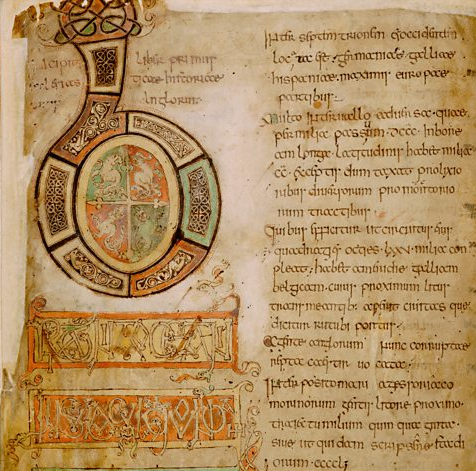
(Continue to Part 5)

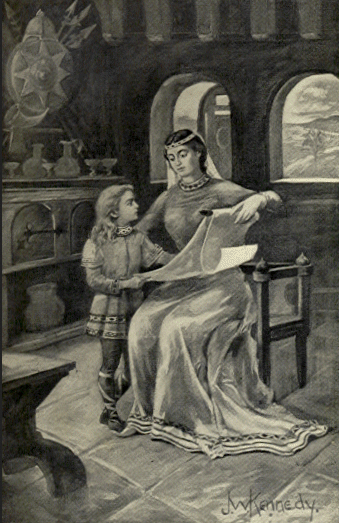

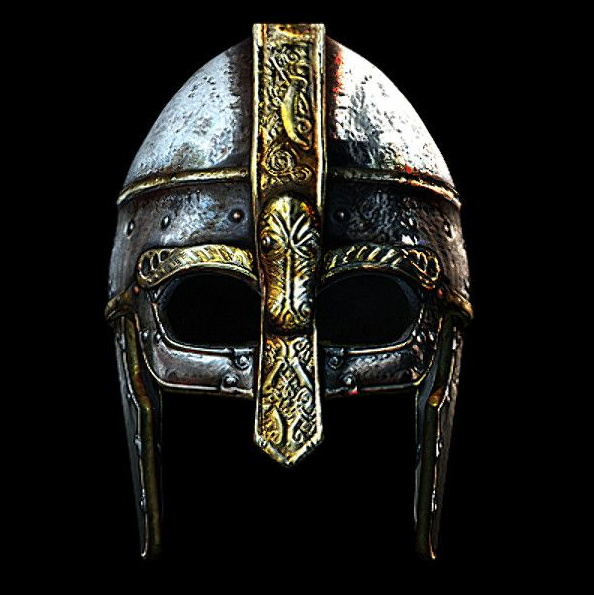






[…] Read Part 4 here […]
[…] Read Part 4 here […]
5